Redditor Told The Surgeon She Reported Him For "Accidentally" Performing The Wrong Surgery On Her Dog, But His Response Was Even More Shocking
It's not surprising why so many people find their sanctuary from this messy world in the company of our furry friends. They make everything look better and more optimistic.
Having a four-legged friend at home means you have devoted your life to that beautiful creature. You have promised to care for it and provide help, food, treatment, and everything else that is needed.
There is literally nothing in this world that a pet owner wouldn't do for their furry companion. If they need us to travel around the world to make them happy, we'll pack our bags and begin our journey—it's that simple.
But when a medical emergency occurs, panic makes us quite stressed, so we rush our sweetie to the vet to solve the problem as quickly as possible. Anyone who has ever had to take a canine to the vet knows that at some point, they sense that you are taking them to the most undesirable place, which tears your soul apart even more.
Luckily, most of the time, what we assume to be a serious issue turns out to be something absolutely benign and absurd. However, in some rare cases, a vet can also make it unbearable for you and turn it into your worst nightmare.
We all know mistakes happen, but performing the wrong surgery on a dog? That's not an accidental mistake; that level of carelessness is absolutely unacceptable.
Unfortunately, that's exactly what happened to a Reddit user and their dog; you can see the full story below.
Here's the story:

The dog had a lump on her shoulder, which required a short procedure to remove it.
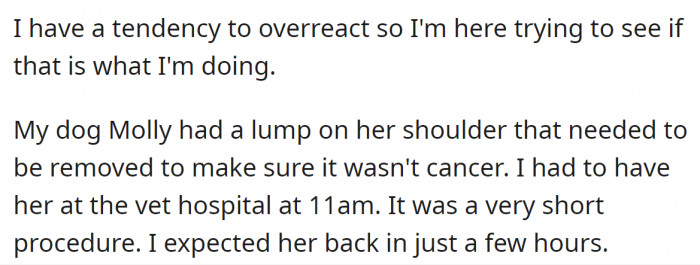
But the surgeon performed the wrong surgery, including the one she actually needed.
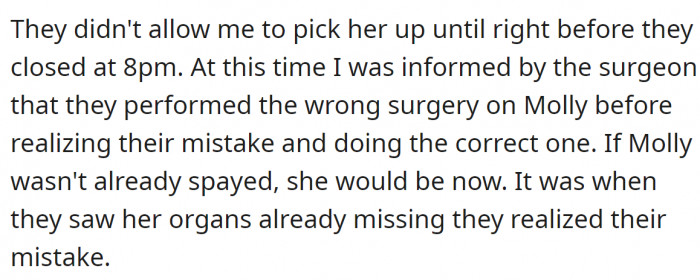
The Impact of Mistakes in Medical Settings
Medical errors, particularly in veterinary practices, can provoke profound emotional responses in pet owners, often due to the deep attachment people have to their pets. Research shows that our animals are often seen as family members, leading to heightened emotional reactions when they are harmed or when mistakes occur. A study published in the Journal of Veterinary Behavior indicated that pet owners experience grief comparable to that of losing a human loved one, which explains the severity of the owner's response in this case.
Moreover, the stress and anxiety that accompany these incidents can exacerbate feelings of helplessness and anger, making it crucial for veterinary professionals to address the emotional fallout from such errors sensitively.
He told her it was just an accident, but she received complimentary teeth cleaning and nail trimming. It sounds like it was supposed to be a consolation or a bribe for the terrible mistake.

But the Redditor couldn't tolerate this "accident" and reported him to the College Board of Veterinarians.
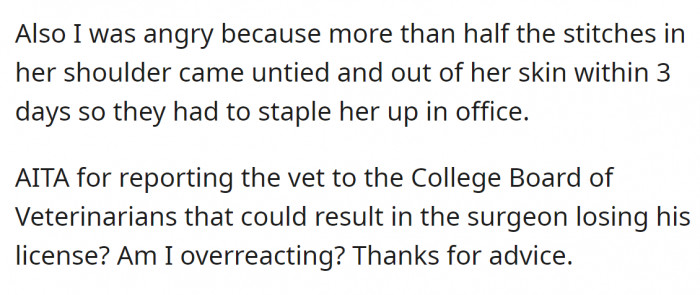
"How the hell was the entire visit not free after he performed an unnecessary surgery on your animal?"
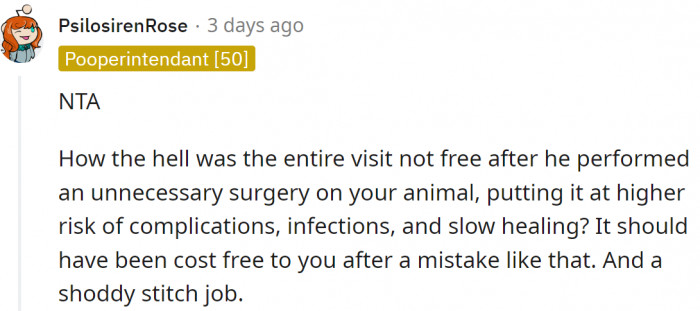
From a psychological perspective, the phenomenon of perceived betrayal can stem from the trust that pet owners place in veterinarians. When that trust is broken, it can trigger a cascade of emotions, including anger, disappointment, and fear. A clinical psychologist might explain that these reactions are rooted in attachment theory, which posits that strong emotional bonds can lead to significant distress when those bonds are threatened.
As noted in studies on emotional regulation, addressing these feelings through open communication and empathy from the veterinarian can help mitigate the psychological impact on the pet owner.
It's so irresponsible.

After this horrific error, finding a new vet is a must.
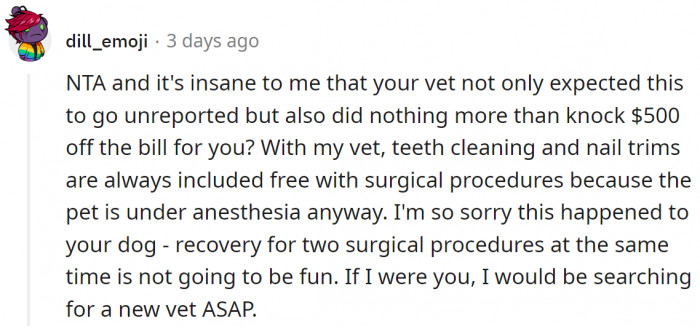
She also had a tattoo, but no one noticed it before the surgery.
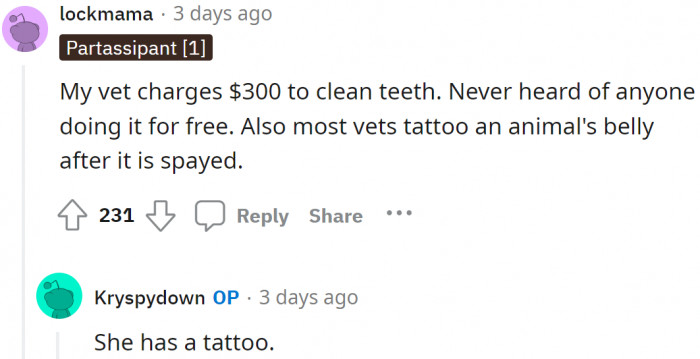
Coping with Emotional Distress After a Medical Error
To cope with the emotional distress caused by medical errors, it's essential for pet owners to engage in proactive emotional processing. Research from the University of Pennsylvania emphasizes the importance of expressing feelings—whether through journaling, talking to friends, or seeking counseling—which can help individuals process their emotions and find closure.
Additionally, participating in support groups for pet owners who have experienced similar situations can provide valuable community support and understanding. These groups often share coping strategies and foster resilience, helping individuals navigate their grief and anger in healthier ways.
"He should have retired well before now."

Everyone would do the same in her shoes.
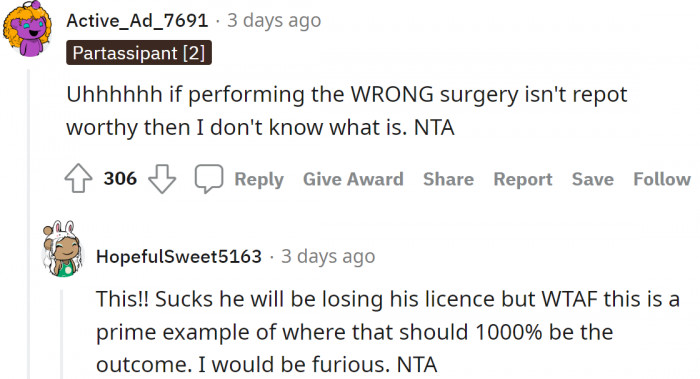
He could accidentally hurt another animal; she was right to report him.

Veterinary professionals should also consider implementing patient-centered communication strategies to help alleviate the distress of pet owners facing medical errors. A study from the American Veterinary Medical Association found that transparency and acknowledgment of mistakes can significantly improve the trust and relationship between veterinarians and clients. By fostering an environment of honesty, pet owners may feel more supported and understood, which can facilitate healing.
Encouraging feedback and providing resources for emotional support can further enhance the therapeutic relationship, allowing both parties to engage in a constructive dialogue about the incident.
"NTA. What if it happens to someone else and something goes even more dramatically wrong?"
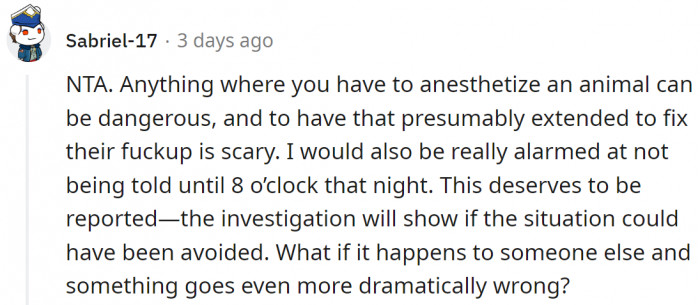
Unfortunately, vets can be very careless.
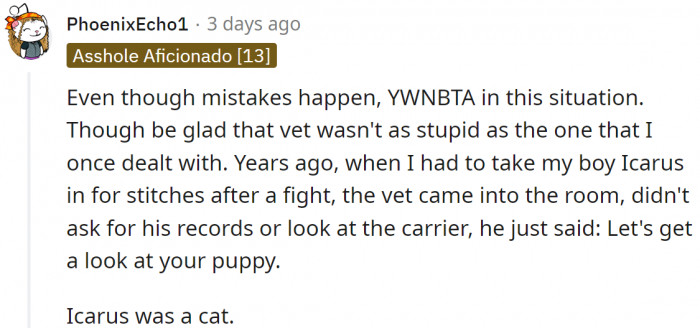
It should be investigated.

"You may have saved someone’s pet!"
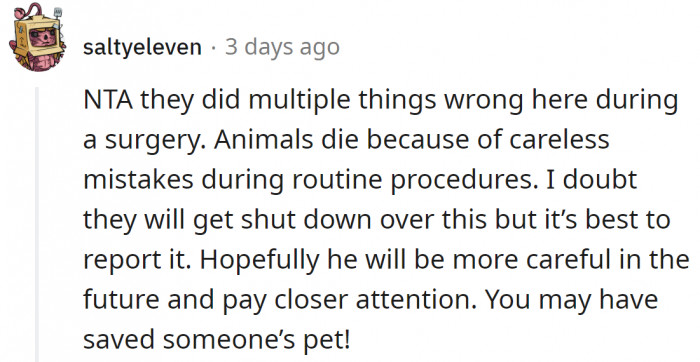
Contacting a lawyer is an additional option.

"Needs to be reported."
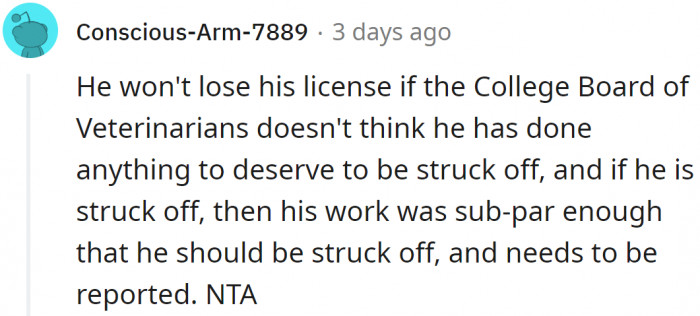
It should be investigated whether there is a pattern of inattention.
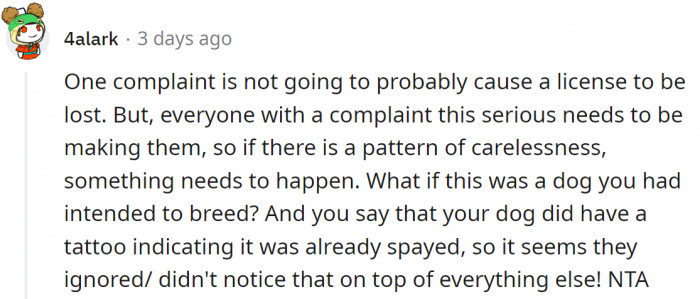
Here's another traumatic experience because of the wrong treatment:
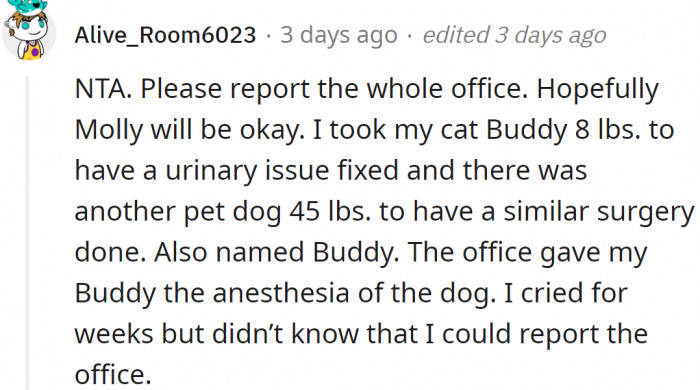
"Just because Molly is a dog doesn’t make the mistake any less traumatic."
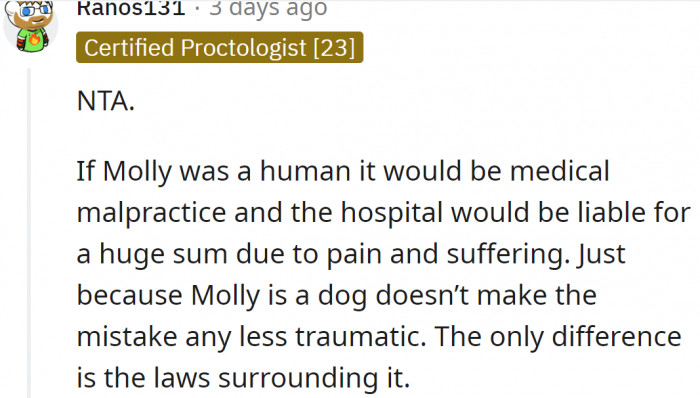
Luckily, the dog is fine now. But the mistake the vet made is simply unforgivable.
Plus, he said he was planning to retire anyway, which could justify his carelessness and the harm done to the poor animal. Next time, he might even kill someone's pet if he doesn't pay attention to his patients and the required procedure.
The Redditor was right to report him.
Psychological Analysis
This incident underscores the complex emotional landscape that pet owners navigate when faced with medical errors. The distress experienced often reflects a deep-seated attachment to their pets, which can amplify feelings of betrayal and hurt when trust is compromised. It's essential for veterinary professionals to not only acknowledge the mistake but also to offer compassionate support to help pet owners process their feelings.
Analysis generated by AI
Analysis & Alternative Approaches
Research consistently underscores the importance of emotional support and effective communication in the aftermath of medical errors. As noted by Dr. William Doherty, family therapist, "Addressing emotional reactions is essential for healing, not just for the pet but for the owner as well." Recognizing the profound bonds between humans and animals is crucial in fostering empathy during these challenging situations, as highlighted on Psychology Today, which emphasizes the need for compassionate communication in veterinary practices.



